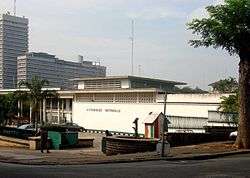National Assembly (Ivory Coast)
The National Assembly is lower house of the Parliament of Ivory Coast since November 2016. From 1960 to 2016, The National Assembly was Ivory Coast's unicameral legislative body. Evolved from semi-representative bodies of the French Colonial period, the first National Assembly was constituted on 27 November 1960 with 70 elected members (députés) in accordance with the Constitution of 31 October 1960, which created the First Republic.
National Assembly Assemblée nationale | |
|---|---|
| Parliament of Ivory Coast | |
.svg.png) | |
| Type | |
| Type | Lower House of the Parliament of Ivory Coast |
| Leadership | |
President | |
| Structure | |
_diagram.svg.png) | |
Political groups | Government coalition (167)
Opposition (12)
Non-partisan (76)
|
| Elections | |
| First past the post | |
Last election | 18 December 2016 |
| Meeting place | |
 | |
| Le Plateau, Abidjan | |
| Website | |
| www | |
 |
|---|
| This article is part of a series on the politics and government of Ivory Coast |
|
|
|
|
Legislative power in Ivory Coast is exercised by Deputies elected from Constituencies (Circonscriptions) by a Scrutin de Liste or Plurality-at-large voting which has neither a proportional representation or panachage element common in many such systems.[1] The powers of this Assembly expire at the end of its second regular session (session ordinaire) in the fifth year of its mandate. The Assembly is then reformed by election from candidates who must be Ivorian citizens of 25 years or older who have never renounced their Ivorian nationality.[2]
The first National Assembly of the Second Republic of Ivory Coast elected for the period 2000–2005 was marked by both internal political crisis and the Ivorian Civil War. No elections were held in 2005, but with the peace deal ending the Civil War, elections are expected on 30 November 2008.[3]
The 2011 Ivorian parliamentary election was dominated by the Rally of the Republicans, the party of President Alassane Ouattara, followed by the Democratic Party of Côte d'Ivoire – African Democratic Rally. The current National Assembly is made up of 255 elected officials, with Guillaume Kigbafori Soro (RDR) as the current president.
After a new constitution was approved by referendum and ratified, members will exceptionally be elected for a four-years term, instead of a five-years term usually, until the 2020 Ivorian parliamentary election. Though the Parliament is officially bicameral, the National Assembly will act as Parliament until the Senate will be established.
Presidents of the National Assembly
Below is a list of Presidents of the Conseil général:
| Name | Entered office | Left office |
|---|---|---|
| Auguste Denise | 1947 | 1950 |
Below is a list of Presidents of the Territorial Assembly:
| Name | Entered office | Left office |
|---|---|---|
| Victor Capai Djédjé | 1950 | 1953 |
| Félix Houphouët-Boigny | 1953 | 1959 |
Below is a list of Presidents of the National Assembly:
| Name | Entered office | Left office |
|---|---|---|
| Philippe Yacé | 27 April 1959 | 1980 |
| Henri Konan Bédié | December 1980 | 1993 |
| Charles Bauza Donwahi | 8 January 1993 | 2 April 1997 |
| Émile Atta Brou | 1997 | 1999 |
| Mamadou Koulibaly | 22 January 2001 | 12 March 2012 |
| Guillaume Kigbafori Soro | 12 March 2012 | 8 February 2019 |
| Amadou Soumahoro | 7 March 2019 | Present |
Last election results
See also
- History of Ivory Coast
- Legislative Branch
- Politics of Ivory Coast
- List of national legislatures
References
- Loi N° 2000-514 du 1er août portant code électoral, article 68.
- Loi N° 2000-514 du 1er août portant code électoral, article 71.
- Poll expert sees Ivory Coast elections delay. Reuters, Ange Aboa, 04 Aug 2008.
- Portions of this article were translated from the French language Wikipedia entry fr:Assemblée nationale (Côte d'Ivoire), 2008-08-18.